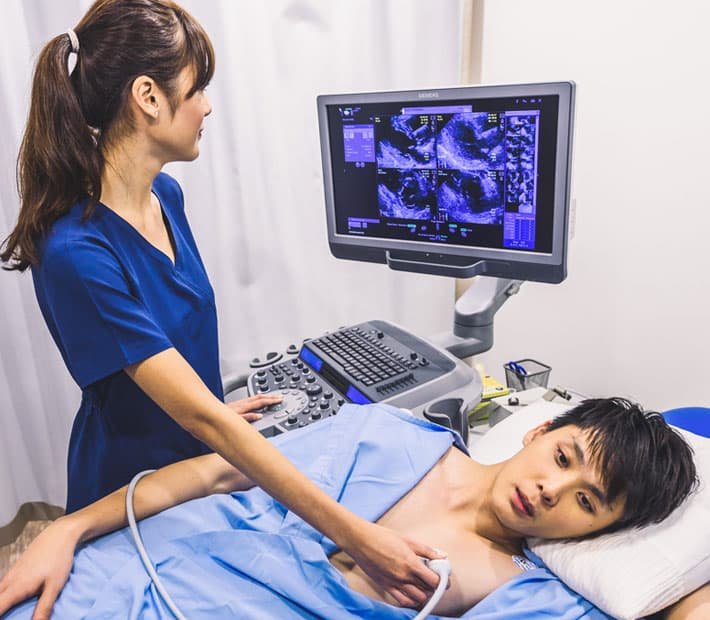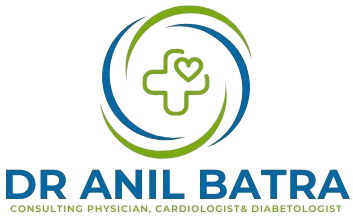What is Echocardiography?
Echocardiography is a medical test that helps doctors assess how well your heart functions. It uses sound waves to create images of your heart and its parts, such as the chambers and valves. These pictures are called echocardiograms. Think of your heart as a busy pump, constantly working to keep your blood flowing smoothly throughout your body. Sometimes, you need a check-up to ensure everything is fine. Dr. Anil Batra, a consulting physician in Bhopal, examines patients’ hearts with echocardiography.
During the test, you lie quietly while a technician moves a small device, called a transducer, around your chest. The transducer sends sound waves into your body. It captures the echoes that bounce back from your heart.
Echocardiography is both painless and safe. It’s similar to taking a picture of your heart’s function, without the use of needles or cuts. The test typically lasts about 30 minutes. Once it’s complete, you can immediately return to your regular activities.

Types of Echocardiography
Echocardiography includes different types, each providing detailed heart images. These images help doctors, such as Dr. Anil Batra, a consulting physician in Bhopal, better understand your heart’s condition.
Transthoracic Echocardiography (TTE):
TTE, or transthoracic echocardiogram, is the most common type of echocardiogram. During this procedure, a technician places a transducer on your chest, capturing images of the heart’s structures through the chest wall. Dr. Anil Batra often uses TTE to check for abnormalities in the heart’s size, shape, and pumping efficiency.
Transesophageal Echocardiography (TEE):
In contrast, the transesophageal echocardiogram (TEE) involves inserting a small transducer into the esophagus, which is located close to the heart. This procedure provides clearer and more detailed images of the heart’s chambers and valves. Dr. Anil Batra may recommend TEE when he needs more detailed images, such as to diagnose heart valve problems or blood clots.
Stress Echocardiography:
Stress echocardiography is performed either during exercise or with medication-induced stress to evaluate how well the heart functions under physical strain. Dr. Anil Batra uses this type of echocardiogram to detect coronary artery disease and assess how the heart responds to stress.
Doppler Echocardiography:
Doppler echocardiography measures both the speed and direction of blood flow through the heart’s chambers and blood vessels. Dr. Anil Batra uses this test to assess abnormalities in blood flow, such as valve leaks or narrowed blood vessels.
3D Echocardiography:
3D echocardiography offers an advanced, three-dimensional view of the heart’s structures. It provides a clearer image, making it useful for diagnosis and surgical planning. Dr. Anil Batra may use 3D echocardiography to make precise assessments of more complex heart conditions.
Each type of echocardiography plays a crucial role in diagnosing and treating heart conditions. Doctors like Dr. Anil Batra, a consulting physician in Bhopal, use these techniques to provide more effective care. By utilizing echocardiography, Dr. Batra ensures that patients’ heart health is monitored closely and accurately, leading to better treatment outcomes.
Why is echocardiography done?
Dr. Anil Batra, the best consulting physician in Bhopal, recommends some reasons for getting an echocardiography done:
To Check Your Heart's Health
Echocardiography is a test that doctors, such as Dr. Anil Batra, a consulting physician in Bhopal, use to evaluate how well your heart functions. This test provides valuable information about your heart’s performance and overall health.
To See Inside Your Heart
This test uses sound waves, similar to how you hear an echo, to generate images of your heart. Furthermore, these images display the size, shape, and movement of your heart along with its components.
To identify Problems
Echocardiography helps doctors identify various problems. For example, it can reveal heart disease, heart murmurs (which are unusual sounds in the heart), and issues with heart valves (which ensure that blood flows in the correct direction).
To Monitor Treatment
If you have a heart problem, echocardiography can also assess whether treatments, such as medication or surgery, are helping you improve. Additionally, this test provides valuable feedback on your recovery progress.
To Plan Surgeries
Before heart surgeries, doctors use echocardiography to plan how to address any problems with your heart. This preparation plays a crucial role in ensuring that they are ready for the procedure. Moreover, it helps keep you safe during the surgery.
To Keep You Healthy
Getting an echocardiogram when your doctor recommends it can significantly help maintain your heart health. In addition, early detection of any issues is crucial for receiving the appropriate treatment. Ultimately, this proactive approach can lead to better health outcomes.
Frequently Asked Questions
An echocardiogram, or echo for short, is a painless test that uses sound waves to create images of your heart. These images show how well your heart functions and help doctors like Dr. Anil Batra in Bhopal determine whether everything is okay with your heart.
Doctors might order an echocardiogram if they suspect a problem with your heart. This test can reveal issues with the size, shape, or movement of your heart. It’s like taking a picture of your heart to see how it’s functioning inside.
Dr. Anil Batra will review the pictures from your echocardiogram and discuss the results with you. Sometimes, if he needs more tests, you may have to wait a bit longer for a complete answer.
If the echocardiogram shows a problem, don’t worry! Dr. Anil Batra will explain what it means and what steps you can take to feel better. Sometimes, it might just involve a change in lifestyle or taking some medication.
